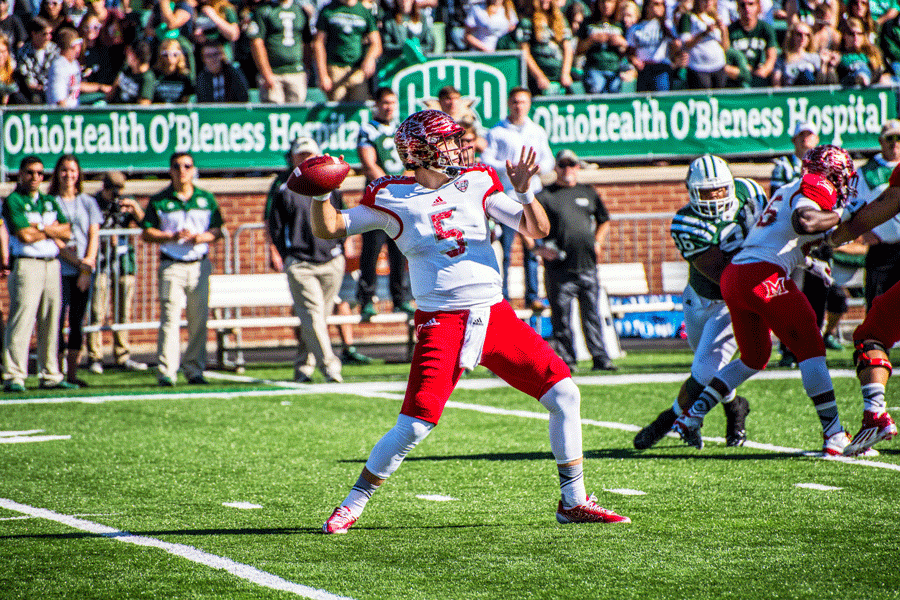If there's one thing we've learned about Miami football head coach Chuck Martin, it's that he's not afraid to play freshmen.
But, Martin isn't playing freshmen only because they deserve it, he's playing them because he has to.
"At this point, if we thought other guys gave us the chance to win, we'd be playing the other guys," Martin said in his weekly press conference. "We're not selling the season for the youth movement … you'd always rather play juniors and seniors. They're your druthers. But that's not where we're at right now."
Sixty-two members of the team's 110-man roster are true or redshirt freshmen; so naturally, several were expected to see playing time.
Of the 45 players who saw the field last week against Ohio University, 25 were freshmen.
Martin had three freshmen linebackers, one freshmen defensive back and two freshmen linemen play the first defensive drive of the game.
As for freshmen on offense, two quarterbacks, four running backs, one tight end and two wide receivers frequent the lineup.
The inexperience is certainly a significant factor for a team that ranks 114th out of 128 NCAA Division-I teams in yards per game (334) and 127th in points per game (15). No wonder the RedHawks' record is 1-5 this year. But that doesn't worry Martin.
"We want to rebuild Miami's football program the right way," he said.
Martin entertained the thought of bringing in one-year transfers to replace the void Andrew Hendrix left at quarterback. Even then, he described finding success during a short-term restock as "catching lightning in a bottle."
"If I take another one-year quarterback, yeah, we'd probably be playing better on offense right now," Martin said. "But then he's gone and when does the cycle end?"
Rebuilding the program starts with solid back-to-back recruiting classes. For now, it means playing the most talented team members, of which the majority happens to be freshmen.
Enjoy what you're reading?
Signup for our newsletter
But how does the early spotlight affect the young athletes?
Doctor James Slager, sports psychologist to Miami student-athletes, said freshmen players may naturally have anxiety when they arrive on campus due to the move from high school to college.
"Obviously, the transition is very difficult because the bar is raised in everything - socially, academically," Slager said. "When they show up here, there's what I refer to as the 'deer in the headlights' look. That's like, what's going on here?"
First-year athletes face the same challenges as other college freshmen: adapting to newfound freedom, homesickness, finding friends, roommate conflicts, difficult classes and navigating a culture of parties and alcohol.
Add high expectations on the football field, and it becomes more challenging to adjust.
"When that ability is challenged - and they've been king of the hill, and then they come in and all of the sudden there's lots of kings, and all of the sudden everything's not easy, and everything speeds up - it takes a while," Slager said.
Coaches quickly threw Billy Bahl into the spotlight, hoping to fill the hole at quarterback. Fourteen percent of Bahl's passes have been intercepted. His nine picks are tied for second-worst in the country. The QB he's tied with, junior Jared Goff of UC Berkeley, has attempted 225 passes, while Bahl has attempted 64.
Gus Ragland, Kenny Young, Leonard Ross, Alonzo Smith and Maurice Thomas - all true or redshirt freshmen - control the RedHawks' run game, which ranks in the bottom-20 of the country with 120.5 yards per game.
Starting athletes so early and so often may, at a certain point, prematurely spoil their confidence.
"That's certainly a possibility. It's a risk," Slager said. "I certainly do not want to question Coach Martin's decision about who he plays - he knows a lot more about it than I do. And I think he would know that as well as you and me, that it's a risk."
Nevertheless, Slager said it's just a matter of athletes picking themselves up after a tough outing.
"It's not the end of the world," Slager said. "It's just part of growing up and learning. So the attention, for me, would be on how we use that experience as assessing where we are, and then figure out what we gotta do differently."
"Mostly, it's just learning to trust yourself again and learning what it takes to be successful. There's certainly times when you're out there, on the field or on the court, when you doubt that."
Though the statistics are bleak, the talent level outshines the numbers, and that's what Martin notices.
"Three years from now they're gonna be in their fourth year at Miami, and they're still going to be playing," Martin said. "We'll look back at these days, and we'll know that we went through some tough times to get this program back to a championship program."
It might not take three years, though.
"Sometimes, it can turn a lot quicker than you think," Martin hinted. "I've been a part of it before. I was at a program that was 6-9 in a 15-game span. And then it turned and we went 121-9."
But as far as his plan to start freshmen goes, Martin isn't worried about it.
"They hired me to do a job here," Martin said. "They knew the task. I knew the task ahead of me. We have a very good plan and we're confident that sooner rather than later, we'll be playing very good football at Miami."




